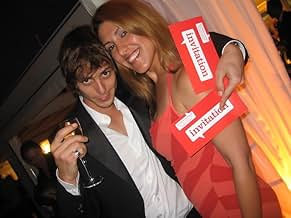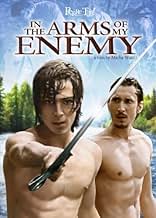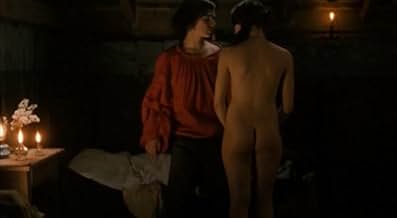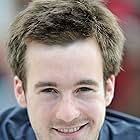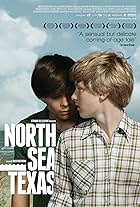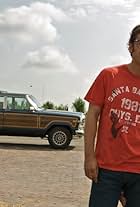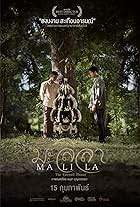Four men living in Eastern Europe in 1856 get caught up in tales of thievery, murder and revenge.Four men living in Eastern Europe in 1856 get caught up in tales of thievery, murder and revenge.Four men living in Eastern Europe in 1856 get caught up in tales of thievery, murder and revenge.
- Awards
- 3 nominations
Morgan Marinne
- Piotr
- (as Morgan Marine)
Amaury Smets
- Elias enfant
- (as Amaury Smetz)
- Director
- Writer
- All cast & crew
- Production, box office & more at IMDbPro
Storyline
Did you know
- TriviaMylène St-Sauveur was 16 during filming.
Featured review
Micha Wald has created a strong masculine drama as writer and director of 'VOLEURS DE CHEVAUX' (IN THE ARMS OF MY ENEMY), a film with a grand sweeping view of nineteenth century life in the region of Russia and has accomplished this with a very small budget, a cast a both unknown and new actors, and a production crew sensitive to place and atmosphere. For some reason the marketing of this film has been directed to a particular audience instead of emphasizing the broad spectrum of those who love epic dramas. It deserves very wide attention, as it is an excellent meditation on the rigors of filial love among the destitute of the period.
Part I: Him: Jakub (Adrien Jolivet) is the diminutive but strong older brother of Vladimir (Grégoire Leprince-Ringuet), a gentle and handsome young lad who depends on Jakub's 'parenting'. The two destitute brothers fend for themselves, dressed in rags, begging for food and work, until they encounter a group of soldiers who are enlisting young men to be Cossacks. Jakub sees the opportunity for food and shelter and 'belonging' and encourages Vladimir to join him in enlisting. The rigors of 'boot camp' drive Jakub to dangerous extremes and result in his being punished and imprisoned for varying periods of time while he still masters fighting techniques and equestrian skills: the more defenseless Vladimir falls victim to abuses at the hands of his fellow recruits. When Jakub discovers that Vladimir has been raped, he resorts to serious fighting and the two brothers are placed in a solitary confinement box. When their training period is over, the boys witness the brutality of the Cossacks as they slaughter innocent families, and this is the breaking point that drives them to desertion. They escape the Cossacks on stolen horses, but while bathing in a river, their horses are stolen.
Part II: Them: The horse thieves are two other impoverished brothers with a strong parallel - Roman (Grégoire Colin) is the stronger, pugilistic older brother who takes care of his younger brother Elias (François-René Dupont), a gentle lad crippled in youth by a goring from a ram but who maintains an ability to communicate with animals. They live humbly in a forest shack and an underground hideaway, and when they make their rare excursions into the village tavern, Roman jealously guards the more fragile Elias, threatening even the girl Virina (Mylène St-Sauveur) with whom Elias is infatuated. Using a combination of their skills, Roman and Elias steal the horses of Jakub and Vladimir, and the trail of vengeance begins.
Part III: Us: Both sets of brothers are needy and their destinies collide due to the theft of horses. Tragedies mount, both sets of brothers intensify their filial bond of compassion, but the older brothers fight to the death of one and in the end one of the brothers provides succor to the survivor of the other set of brothers and the ending leaves the audience to guess the future altered by violence and need.
Micha Wald draws powerful performances from his young cast of beautiful actors and with a minimum of dialogue ( in French with English subtitles) he creates wholly credible characters about whom we care very much. The cinematography by Jean-Paul de Zaetijd is superb and the haunting musical score by Jóhann Jóhannsson, Jeff Mercelis and Stephan Micus is rich in capturing the harmonies of the music of the period and the location. In all, this is a visually stunning film and a story that is subtle and touching and impressively sophisticated in the manner in which it is told. Highly recommended. Grady Harp
Part I: Him: Jakub (Adrien Jolivet) is the diminutive but strong older brother of Vladimir (Grégoire Leprince-Ringuet), a gentle and handsome young lad who depends on Jakub's 'parenting'. The two destitute brothers fend for themselves, dressed in rags, begging for food and work, until they encounter a group of soldiers who are enlisting young men to be Cossacks. Jakub sees the opportunity for food and shelter and 'belonging' and encourages Vladimir to join him in enlisting. The rigors of 'boot camp' drive Jakub to dangerous extremes and result in his being punished and imprisoned for varying periods of time while he still masters fighting techniques and equestrian skills: the more defenseless Vladimir falls victim to abuses at the hands of his fellow recruits. When Jakub discovers that Vladimir has been raped, he resorts to serious fighting and the two brothers are placed in a solitary confinement box. When their training period is over, the boys witness the brutality of the Cossacks as they slaughter innocent families, and this is the breaking point that drives them to desertion. They escape the Cossacks on stolen horses, but while bathing in a river, their horses are stolen.
Part II: Them: The horse thieves are two other impoverished brothers with a strong parallel - Roman (Grégoire Colin) is the stronger, pugilistic older brother who takes care of his younger brother Elias (François-René Dupont), a gentle lad crippled in youth by a goring from a ram but who maintains an ability to communicate with animals. They live humbly in a forest shack and an underground hideaway, and when they make their rare excursions into the village tavern, Roman jealously guards the more fragile Elias, threatening even the girl Virina (Mylène St-Sauveur) with whom Elias is infatuated. Using a combination of their skills, Roman and Elias steal the horses of Jakub and Vladimir, and the trail of vengeance begins.
Part III: Us: Both sets of brothers are needy and their destinies collide due to the theft of horses. Tragedies mount, both sets of brothers intensify their filial bond of compassion, but the older brothers fight to the death of one and in the end one of the brothers provides succor to the survivor of the other set of brothers and the ending leaves the audience to guess the future altered by violence and need.
Micha Wald draws powerful performances from his young cast of beautiful actors and with a minimum of dialogue ( in French with English subtitles) he creates wholly credible characters about whom we care very much. The cinematography by Jean-Paul de Zaetijd is superb and the haunting musical score by Jóhann Jóhannsson, Jeff Mercelis and Stephan Micus is rich in capturing the harmonies of the music of the period and the location. In all, this is a visually stunning film and a story that is subtle and touching and impressively sophisticated in the manner in which it is told. Highly recommended. Grady Harp
Details
Box office
- Gross worldwide
- $38,001
- Runtime1 hour 25 minutes
- Color
- Aspect ratio
- 1.85 : 1
Contribute to this page
Suggest an edit or add missing content

Top Gap
By what name was In the Arms of My Enemy (2007) officially released in Canada in English?
Answer
